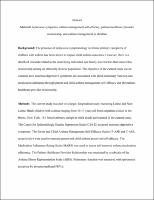Please use this identifier to cite or link to this item:
https://hdl.handle.net/20.500.12202/5801| Title: | Maternal depressive symptoms, asthma management self-efficacy, patient-healthcare provider relationship, and asthma management in children |
| Authors: | Feldman, Jonathan Gonzalez, Jeffrey Weinberger, Andrea Salton, William Matte, Lynne Zeigler, Ariel |
| Issue Date: | Jun-2020 |
| Citation: | Zeigler, Ariel. (2020) Maternal depressive symptoms, asthma management self-efficacy, patient-healthcare provider relationship, and asthma management in children. [Unpublished doctoral dissertation, Yeshiva University] |
| Abstract: | Background: The presence of depressive symptomology in female primary caregivers of children with asthma has been shown to impact child asthma outcomes. However, there is a dearth of research related to the underlying individual and family level factors that impact this relationship among an ethnically diverse population. The objective of the current study was to examine how maternal depressive symptoms are associated with child pulmonary function and medication adherence through parent and child asthma management self-efficacy and the patient healthcare provider relationship.======= Methods: The current study was part of a larger, longitudinal study recruiting Latino and Non- Latino Black children with asthma ranging from 10-17 years old from outpatient clinics in the Bronx, New York. 153 female primary caregiver-child dyads participated in the current study. The Center for Epidemiologic Studies Depression Scale (CES-D) assessed maternal depressive symptoms. The Parent and Child Asthma Management Self-Efficacy Scales (P-ASE and C-ASE, respectively) were used to measure parent and child asthma perceived self-efficacy. The Medication Adherence Rating Scale (MARS) was used to assess self-reported asthma medication adherence. The Patient-Healthcare Provider Relationship was measured by a subscale of the Asthma Illness Representation Scale (AIRS). Pulmonary function was measured with spirometry (assessed by percent predicted FEV1).====== Results: The sample was comprised of female primary caregivers who as a majority, selfidentified as non-Latino Black (35.3%) or Puerto Rican (33.3%). Of the participating children, the mean age was 13.31 (SD = 2.3), with 52% identifying as male and 48% identifying as female. Higher maternal depressive symptoms were significantly associated with lower child asthma attack prevention-specific self-efficacy (a = -3.07, p = 0.01). The parent attack prevention subscale of the P-ASE was significantly correlated with the total score on the patienthealth care provider subscale (r = .239, p < .01), indicating that better self-efficacy related to attack prevention was associated with a stronger patient-provider relationship. The interaction effect between maternal depressive symptoms x child age for parent asthma management selfefficacy was significant (β = 1.26, p = 0.04). This demonstrated that for younger children, as maternal depressive symptoms increased, parent perceived asthma management self-efficacy decreased. Neither parent (ab = -0.05, 95% CI [-0.88, 1.12]) nor child (ab = 0.02, 95% CI [-0.03, 0.11]) asthma management self-efficacy mediated the relationship between maternal depressive symptoms and child pulmonary function. Neither the patient-healthcare provider relationship (ab = -0.02, 95% CI [-0.11, 0.03]) nor child asthma management self-efficacy (ab = 0.01, 95% CI [- 0.03, 0.08]) mediated the relationship between maternal depressive symptoms and medication adherence. ==== Discussion: Mediation did not occur in any of the statistical models. The present study was innovative in examining the associations between maternal mental health and child asthma outcomes among an ethnically diverse population. Maternal depressive symptoms were associated with prevention-specific aspects of child asthma management self-efficacy, which stresses the importance of considering both the child and mother individually and as a dyad in pediatric asthma care. Results of the study also reinforce the importance of considering the quality of the patient-provider relationship and how this relationship may impact perceived selfefficacy related to asthma management. The findings additionally highlight the importance of considering the mental health of the mother and the implications of maternal mental health on child asthma outcomes. It is imperative that pediatric providers not only increase discussions around effective asthma management and care to both the mother and the child, but also consider the role of maternal depressive symptoms. |
| Description: | Doctoral dissertation, Ph.D., Ferkauf Graduate School of Psychology . Open Access |
| URI: | https://hdl.handle.net/20.500.12202/5801 |
| Appears in Collections: | Ferkauf Graduate School of Psychology: Doctoral Dissertations |
Files in This Item:
| File | Description | Size | Format | |
|---|---|---|---|---|
| Dissertation_Zeigler Ariel OA June 2020_.pdf | 1.63 MB | Adobe PDF |  View/Open |
This item is licensed under a Creative Commons License

